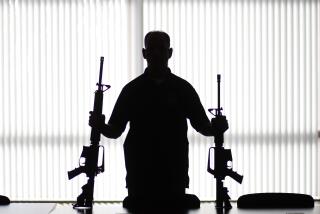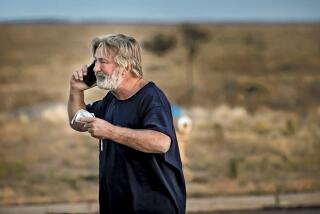The Fight Against Crime: Notes From the Front : This Bullet Has the Gunman’s Name on It
- Share via
All over, people are talking about antidotes to crime: ban guns, ban ammunition, “three strikes and you’re out.” In prison. Forever.
Now, Bill Collier, a 42-year-old Glendale bicycle shop owner and part-time tinkerer, has an idea too.
For the record:
12:00 a.m. June 18, 1994 For the Record
Los Angeles Times Saturday June 18, 1994 Valley Edition Metro Part B Page 2 Column 1 No Desk 1 inches; 31 words Type of Material: Correction
Bullets--In the Streetbeat column in Tuesday’s Valley edition of The Times, the estimated number of bullets fired annually in the United States was incorrect. The correct number is between 6.3 billion and 14.8 billion.
Collier says he has invented a magic bullet. Not to kill werewolves or even criminals, but a bullet with a special identification encryption that would make individual slugs traceable back to the original purchaser.
No more mysterious bullets dug out of corpses or brick walls or palm trees, Collier says.
“When someone buys a bullet, it would be registered to that individual,” said Collier, who says he created the bullet with his brother. “The serial number would correspond to a name. Then, (police) would at least have a starting point. It makes you responsible for pulling the trigger.”
Collier is no gun hater. He has owned firearms since he was a teen-ager and detests the idea of gun registration. But the outbreak of drive-by shootings caused him to think again.
“Everyone should have the right to have a gun. I just want them to be responsible,” he said.
Because there is a patent pending, Collier says he won’t go into much detail about his bullet. What he will say is that each round would be marked on both the cartridge casing and the bullet itself--the part of the cartridge that is fired out the barrel--and that ammunition dealers could then be required to record serial numbers and the names of buyers.
This would increase the cost of cartridges about 10% to 15%, he estimates. He contends his system would work with all calibers, even the multiple-round balls fired by shotguns, but won’t say how. You know, patents and all.
And yes, Collier admits, if all this pans out and leads legislatures around the country to mandate traceable bullets, he and his brother would get quite rich.
“You know, that’s what people say to us all the time,” he said. “But making money wasn’t why we did this. It’s because society has just got to get better.”
Don’t expect gun buffs to mention the Collier brothers in the same breath as Browning (inventor of the automatic rifle) and Sam Colt (father of the revolver).
“It doesn’t sound like such a good idea to me,” said Dan Childs, a salesman at Turner’s Outdoorsman in Reseda. “When we buy ammunition, we are buying millions of rounds at a time. I don’t know how you could possibly (individually mark) ammunition at that level.”
But Collier, who has spent in the neighborhood of $10,000 on his idea, says yes, his system is capable of marking the estimated 6.3 to 14.8 million bullets fired by Americans last year.
Barry Collin, president of the Institute of Security and Intelligence, a Palo Alto-based think tank that came up with that estimate, said Collier’s system appears to face some big problems.
First, said Collin, the inventor may not have taken into account that slugs become deformed--perhaps unreadable--by striking hard objects or even the soft tissue of human organs.
Also, there are the problems of imported ammunition and ammunition reloading hobbyists, who recycle spent cartridge casings by refilling them with powder and attaching home-cast bullets, or bullets bought individually.
Critics also maintain that criminals are unlikely to buy identifiable ammunition, promoting another illicit industry: illegal cartridge manufacturing.
Still, Collier insists that if his bullets helped solve even a handful of crimes, that would be worthwhile. “A lot of people think I’m nuts,” he says. “The people that are going to support it are people who have lost lives in the way of family.”
More to Read
Sign up for Essential California
The most important California stories and recommendations in your inbox every morning.
You may occasionally receive promotional content from the Los Angeles Times.













